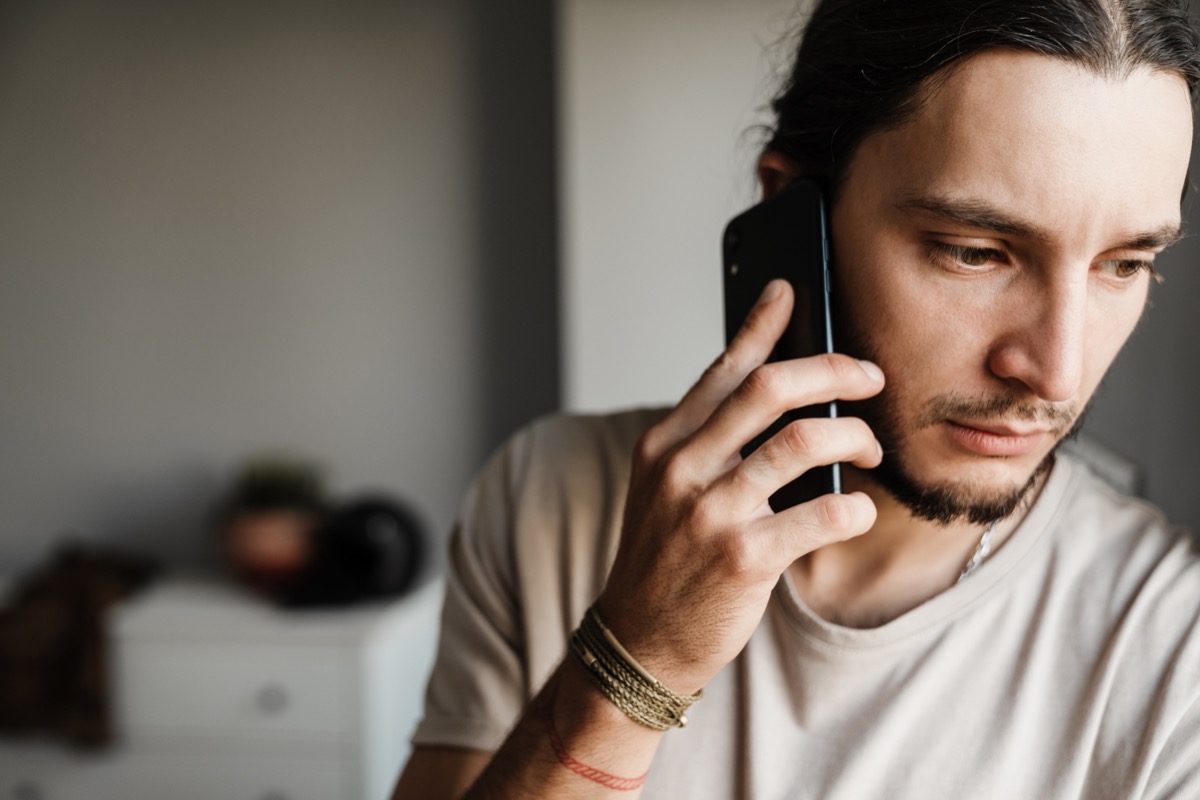If You Get This Call From the Police, Hang Up Immediately, Officials Warn

On the list of jarring phone calls you could receive, getting one from the police arguably stands out near the top for most people. Whether it’s as stressful as being asked a few questions about a recent crime or as serious as delivering bad news, it’s rarely a happy occasion. But the next time you get a phone call from someone claiming to be the cops, it may present a different type of problem: A sophisticated new phone scam involving fake police calls is making the rounds. Read on to see how you can avoid being tricked by fraudsters.
READ THIS NEXT: Lowe’s and Target Just Issued This Major Warning to Shoppers.
Phone scams have become an increasingly large problem in the U.S.

Unfortunately, anyone who owns a phone isn’t a stranger to the seemingly endless stream of robocalls and spam text messages that only seem to be getting worse over time. According to the Federal Communications Commission (FCC), U.S. consumers received roughly 4 billion robocalls a month in 2020.
What’s even worse is that technology has not only made it easier for scammers to target larger groups of people, but it also has allowed them to become more sophisticated. The use of “spoofing,” which enables fraudsters to change their numbers to appear more legitimate or hide their true identity, has become rampant—and made it all too easy for criminals to make off with stolen information or money. According to a report from telecommunications security company Truecaller released in 2021, nearly one in three Americans reported falling victim to a phone scam in the past twelve months—and 23 percent reporting having lost money to a phone fraud scheme.
Now, there’s a new type of scam involving police imposters making the rounds.

Lately, the types of scam phone calls can feel as varied as they do endless. But officials are now warning that fraudsters pretending to be police are on the rise, with authorities across the U.S. reporting similar incidents.
In Connecticut’s Coventry County, authentic police cautioned the public about scammers using a spoofing technique to lure local residents into answering their phones. Once on the line, the fake cops asked to verify personal information and even hand over money. Police in Asheville, North Carolina, reported an identical scam that saw imposters calling with news of an outstanding warrant that must be settled immediately with a payment, typically involving a prepaid card and a PIN number.
The Federal Trade Commission (FTC) also outlines other versions of the scam. In some cases, fraudsters will call requesting money to bail out a family member—sometimes even using real names they’ve gathered from social media or the internet. Others will say you’ve been issued a fine for missing jury duty and demand immediate payment.
RELATED: For more up-to-date information, sign up for our daily newsletter.
Here’s how you can tell you’re dealing with a phone scammer.

While not picking up calls from unknown numbers has become somewhat of the norm, it can be hard to hit “ignore” if it appears the police are calling through. But according to authorities, any request for sensitive information such as social security numbers or a demand for payment over the phone should be an immediate red flag that you’re not dealing with genuine cops, especially if the person on the other end is making the action seem urgent.
“It’s unfortunate that scammers try to prey on the fear of others with the threat of jail time,” Capt. Jackie Stepp, Patrol Operations Division Captain for Asheville Police Department, told local CBS affiliate WSPA. “Our officers are not going to call you over the phone to say you owe money and tell you to send the money in.”
And here’s what you should do right away if you get a scam call.

If you believe you’re on the receiving end of one of these scams, the Asheville Police Department says that you should ask for the caller’s name and number before telling them you’ll call back. Then, hang up on the suspected fraudster, look up your local police department’s number, and call them directly to report the incident.
According to the FCC, government agencies will inform you in writing through the mail of any required payments before you receive a phone call. The agency cautions that in many cases, the only calls you can trust are those you’ve dialed using information from a paper statement or on the agency’s official website, so you should never hand over credit card information or prepaid card payments to an unexpected incoming call.
READ THIS NEXT: Never Use Your Phone to Do This, FBI Says in New Warning.